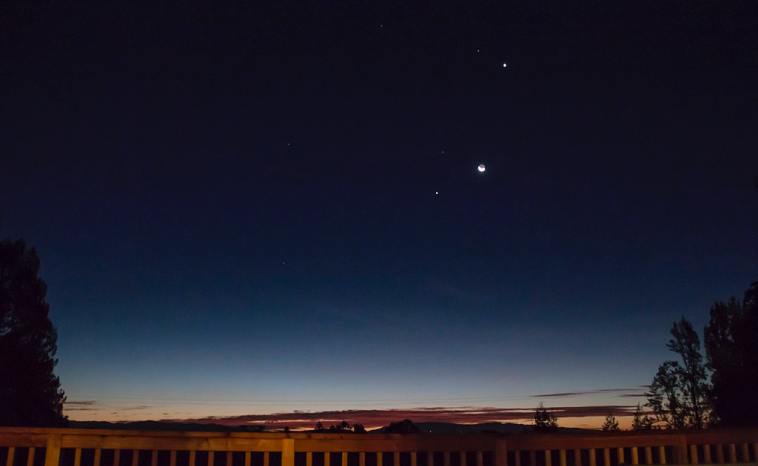How To Find Venus UK

In this article, we’ll share tips and tricks to help you find Venus in the UK night sky, along with some fascinating Venusian facts!
Examining the night sky on a clear evening is a pastime that offers a sense of wonder and a connection to the expansive universe. Among the highlights you can easily spot, one celestial body continues to captivate amateur and experienced observers alike – Venus. Known as the ‘Evening Star’ or ‘Morning Star’, learning how to find Venus in the UK night sky is a rewarding experience. In this guide, we’ll provide you with key strategies to help you locate this radiant planet.
What Is Venus?
Venus, the second planet from the Sun, is often referred to as Earth’s sister planet due to its similar size and composition. It shares many similarities with our home planet, such as being a rocky planet with a thick atmosphere.
The atmosphere of Venus is primarily composed of carbon dioxide, creating a greenhouse effect that leads to extreme temperatures on the surface. The dense clouds that envelop Venus further contribute to its unique characteristics.
However, unlike Earth, Venus lacks liquid water on its surface, making it a harsh and inhospitable environment. Despite these differences, studying Venus provides valuable insights into the evolution and dynamics of planets within our solar system.
When Was Venus Discovered?
Venus has been visible to the naked eye for thousands of years, captivating the attention of humans since ancient times. Its radiant beauty has mesmerised civilisations like the Babylonians and Greeks, who admired the planet’s luminous presence and embedded it in their mythology and astrology, attributing divine significance to this celestial wonder.
However, it wasn’t until the 17th century that Galileo Galilei first observed Venus through a telescope and discovered its phases, similar to those of the moon. Moreover, it would be several more centuries before astronomers would more fully understand the true nature and composition of the planet.
How Did Venus Get its Name?

The name Venus originates from Roman mythology. Venus was the goddess of love and beauty, equivalent to the Greek goddess Aphrodite. The Romans named the planet after her due to its striking, radiant appearance in the sky.
Other cultures have also given names to Venus, often linking it to love or fertility. For example, in Aztec mythology, Venus was known as Tlahuizcalpantecuhtli, the god of dawn and the planet’s morning appearance.
What Does Venus Look Like?
As one of the brightest objects in the sky, Venus can be easily spotted with the naked eye, even in urban areas with light pollution. Its luminosity is often mistaken for a star, but it does not twinkle like actual stars do. Instead, Venus presents itself as a steady, radiant point of light.
Through a telescope, you can observe phases similar to those of the Moon, ranging from a thin crescent to a nearly full disk.
How to Find Venus in the Night Sky UK

liz west from Boxborough, MA, USA, CC BY 2.0, via Wikimedia Commons
liz west from Boxborough, MA, USA, CC BY 2.0, via Wikimedia CommonsSpotting Venus in the night sky is a delightful experience, made easier by its brilliance and proximity to Earth. Typically, the best time to observe Venus is during ‘twilight’, either just after sunset or just before sunrise, depending on its position in its orbit. During these periods, Venus is often the brightest object in the sky, outshone only by the moon and the sun.
Beginners can utilise mobile apps, stargazing charts or a simple compass to locate west after sunset or east before sunrise, which can aid in their quest to find Venus. On the other hand, more advanced observers might employ telescopes to get a clearer view. However, it’s essential to never look directly at the sun with the naked eye or through a telescope, as it can cause severe eye damage.
As with any stargazing session, patience is key, as elements such as weather and light pollution can impact visibility. Despite these challenges, the journey to spot Venus can be an enlightening experience, connecting us with the wonder and vastness of the cosmos.
How To Find Venus in the UK – Key Steps
Finding Venus in the night sky can be an exciting experience, and all you need is a clear view of the western horizon after sunset. Here are a few steps to guide you:
- Timing: Wait until the Sun has set and the sky starts to darken. Venus is most visible during the evening hours.
- Location: Face west, where the Sun has set, and look for a bright “star” that outshines everything else. That’s Venus!
- Position: Venus can appear at different heights above the horizon, so it’s helpful to use landmarks like trees or buildings to gauge its position.
- Tracking: As the night progresses, Venus will move closer to the horizon. Keep an eye on it to witness its beautiful journey across the sky.
The Importance of Studying Venus
Venus may seem like an inhospitable and unremarkable planet, with its thick atmosphere and extreme temperatures. However, studying the planet provides crucial insights into the evolution of planets within our solar system.
The similarities between Earth and Venus raise questions about how two neighbouring planets, with similar sizes and compositions, evolved so differently. Furthermore, studying the atmospheric composition and dynamics of Venus can help us understand the greenhouse effect on Earth and how it contributes to climate change.
Additionally, Venus has been a focal point for space exploration missions, with the first successful landing by the Soviet Venera 7 probe in 1970. Continued study of Venus can provide valuable information for future manned missions and potential human settlements on other planets.
Final Thoughts on Finding Venus in the UK Night Sky
Venus is a fascinating planet that continues to captivate humans with its allure and mystery. Despite being our closest neighbour, there is still so much we have yet to discover about this enigmatic planet.
By following a few simple steps and keeping some tips in mind, you can easily learn to find Venus in the UK night sky and enjoy its beauty. So, grab your binoculars or telescope, find a clear night, and embark on a celestial adventure!
OSR Star Finder App

For more celestial wonders and assistance in identifying stars and planets, why not check out the OSR Star Finder App? Download now and explore the vast universe above us!

